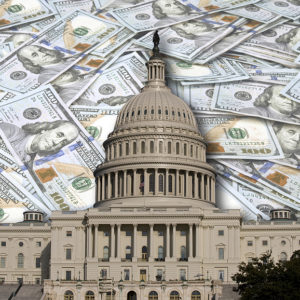Since the earliest days of the coronavirus pandemic, Washington has authorized nearly $6 trillion in new outlays. Much of it was directed toward helping small businesses. But are America’s entrepreneurs better off for this big spending? The evidence says no.
Massive expenditures, which could eventually include the White House’s $1.75 trillion social spending bill being debated in Congress, would add new burdens to small businesses. Congressional bills and massive spending bills will only set up future tax hikes and require more government borrowing as well as the continued monetization of the debt by the Federal Reserve. These actions adversely affect the entrepreneurial environment and capital markets, handcuffing the economy’s top job creators.
Entrepreneurs need the freedom to create, flourish and expand. Regulatory burdens like high taxes, complex regulations, and diminished access to capital shortchange everyone. In this environment, minorities are hurt the most. Research shows entrepreneurship helps African Americans close the income gap with Whites with African American entrepreneurs “more likely than non-entrepreneurs to move into a higher income group,” according to the Hamilton Project.
Reforms are especially needed in states like California, Texas, New York, and Florida, where nearly half of all minority residents live, and where the greatest number of minority-owned businesses are found.
Some progress in reducing burdens on entrepreneurship had been made prior to pandemic shutdowns and government economic interventions. But the federal government’s economic response to the coronavirus pandemic established new burdens on what should have been a vibrant entrepreneurial recovery.
The swelling debt caused by the new outlays is particularly harmful to entrepreneurs. Higher future taxes needed to pay for the spending will cut into the after-tax returns that will hit small businesses particularly hard. They will also cool incentives to start new ventures or expand current operations, resulting in a poorer entrepreneurial and small-business sector.
Yes, some relief dollars have been handed out. But they were not spent efficiently. Funds were sent to people whose incomes weren’t adversely affected by the shutdowns, as well as businesses that weren’t negatively impacted.
While monetary policy can play a role in times of economic distress, the Federal Reserve went far beyond its appropriate role during the pandemic. In its effort to stimulate the economy, whether by design or not, the Federal Reserve enabled Washington’s fiscal profligacy.
What if instead of the open-the-spigot spending, Washington had suspended all federal tax and fees collections for a year, from March 2020 to February of this year? While it would have cost about $3.5 trillion, it would have immediately increased the take-home income of every worker in the country.
This would have helped small businesses with instant cost reductions and allowed them to retrain their workers. At the same time, entrepreneurs would have had greater incentives to expand. At $3.5 trillion, it would have been a bargain for government, the price tag far lower than the additional spending Washington has already approved.
Not only were businesses denied a much-needed tax break, but they were also covered with more red tape. The Regulatory Studies Center at George Washington University tracked more than 200 new regulations issued in 2020 that were due to the COVID-19 pandemic. The damage from many of these new rules was devastating. An especially egregious example is the eviction moratorium. It was a blatant economic taking from rental property owners – often thought of as the ultimate small entrepreneurs – who were not compensated for their losses. Most rental-property owners aren’t giant corporations, but individuals who rely on that income to make ends meet.
Ronald Reagan was exactly right when he said that “outside of its legitimate function, government does nothing as well or as economically as the private sector.” Small businesses and entrepreneurs need lighter regulatory burden, and a tax system with lower rates, simpler compliance, and structured to increase the incentive to work and invest. Meanwhile, the federal government is duty-bound to control its spending. Fiscal discipline isn’t a hallmark of Washington but empowering a more vibrant entrepreneurial sector demands it.
Unless significant reforms are enacted by policymakers, the future for entrepreneurs, whose role in the economy cannot be replaced, will be bleak.

